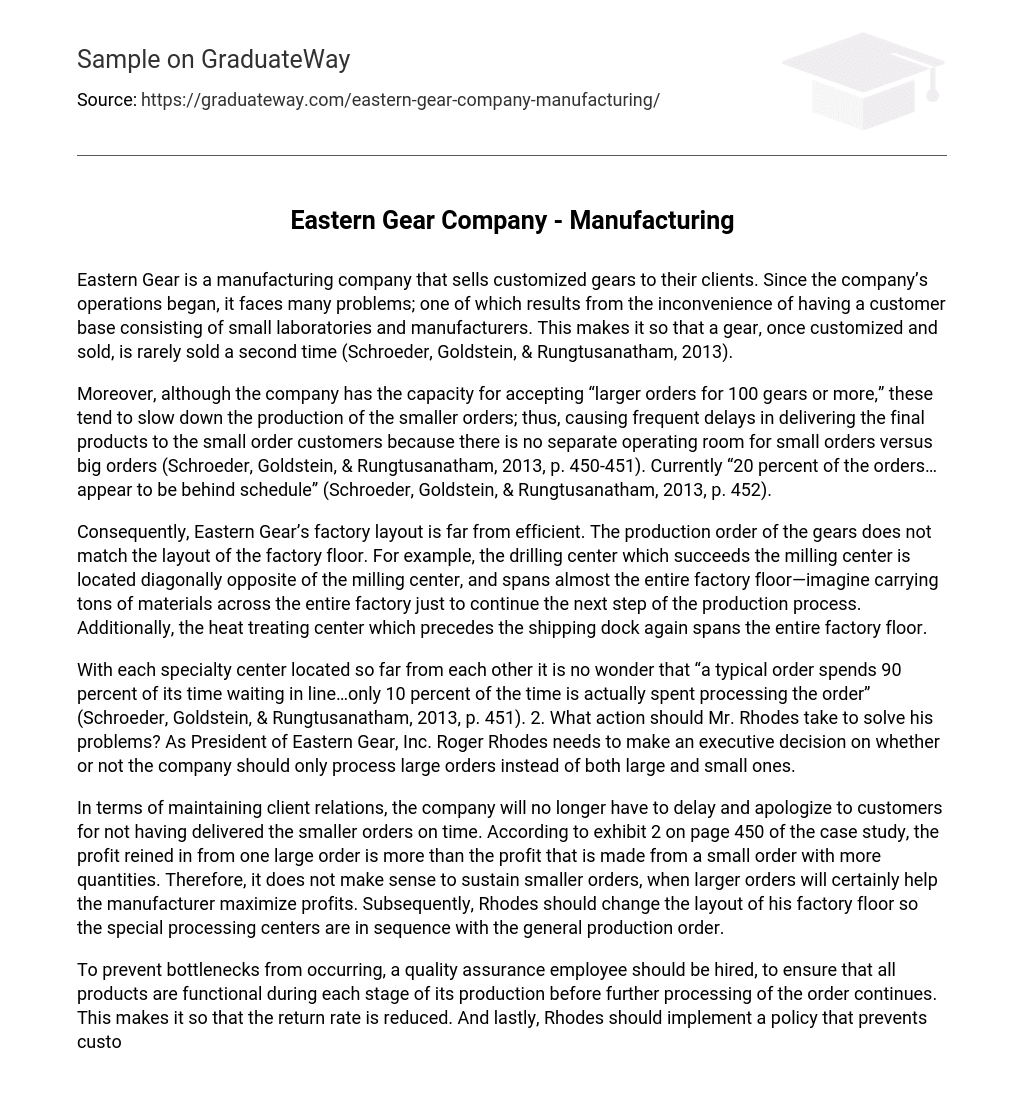Eastern Gear is a manufacturing company that sells customized gears to their clients. Since the company’s operations began, it faces many problems; one of which results from the inconvenience of having a customer base consisting of small laboratories and manufacturers. This makes it so that a gear, once customized and sold, is rarely sold a second time (Schroeder, Goldstein, & Rungtusanatham, 2013).
Moreover, although the company has the capacity for accepting “larger orders for 100 gears or more,” these tend to slow down the production of the smaller orders; thus, causing frequent delays in delivering the final products to the small order customers because there is no separate operating room for small orders versus big orders (Schroeder, Goldstein, & Rungtusanatham, 2013, p. 450-451). Currently “20 percent of the orders…appear to be behind schedule” (Schroeder, Goldstein, & Rungtusanatham, 2013, p. 452).
Consequently, Eastern Gear’s factory layout is far from efficient. The production order of the gears does not match the layout of the factory floor. For example, the drilling center which succeeds the milling center is located diagonally opposite of the milling center, and spans almost the entire factory floor—imagine carrying tons of materials across the entire factory just to continue the next step of the production process. Additionally, the heat treating center which precedes the shipping dock again spans the entire factory floor.
With each specialty center located so far from each other it is no wonder that “a typical order spends 90 percent of its time waiting in line…only 10 percent of the time is actually spent processing the order” (Schroeder, Goldstein, & Rungtusanatham, 2013, p. 451). 2. What action should Mr. Rhodes take to solve his problems? As President of Eastern Gear, Inc. Roger Rhodes needs to make an executive decision on whether or not the company should only process large orders instead of both large and small ones.
In terms of maintaining client relations, the company will no longer have to delay and apologize to customers for not having delivered the smaller orders on time. According to exhibit 2 on page 450 of the case study, the profit reined in from one large order is more than the profit that is made from a small order with more quantities. Therefore, it does not make sense to sustain smaller orders, when larger orders will certainly help the manufacturer maximize profits. Subsequently, Rhodes should change the layout of his factory floor so the special processing centers are in sequence with the general production order.
To prevent bottlenecks from occurring, a quality assurance employee should be hired, to ensure that all products are functional during each stage of its production before further processing of the order continues. This makes it so that the return rate is reduced. And lastly, Rhodes should implement a policy that prevents customers from changing their orders once placed. Eastern Gear currently allows engineers from the client side to modify orders after they have been placed, this not only slows does the production process overall, but also is a waste of time and resources on behalf of the company.
Customers should place their orders, and agree to pay the amount negotiated without having the ability to alter their engineering designs as this causes the manufacturer great severe downtime. 3. How can this case be related to operations strategy and process design concepts? Both operations strategy and process design concepts are applicable to Eastern Gear, Inc. The company’s mission is to customize and deliver gears to their customers in a timely fashion.
Its objectives are to negotiate prices with customers, customize products and deliver the finished goods to the customer in a timely fashion and satisfactory manner. In terms of strategic decisions, the company is severely lacking in process, quality, capacity and inventory. Raw materials are purchased after an order is placed, which then take a few weeks to arrive to the factory. The processing centers are located in a disarray fashion on the factory floor, where goods in process will have to traverse time-consuming distances in order to reach the next processing facility.
There is no quality assurance checks along the way, products simply go through the production stages one by one and are delivered to the customers. Regarding capacity, small orders are constantly being backed up to process larger orders, and deliveries are consistently late. However, there is a process that exists for an order to be made. Engineers from Eastern Gear and the buyer go back forth to finalize the design of the gear before processing and orders are adjusted even during the production phase.
Finally the distinctive competence of Eastern Gear is that it customizes the gears that it sells catering to the original and personal designs of the buyer, a specialty that not many manufacturers have the resources or capabilities of doing. It is this specialization method that allows Eastern Gear to differentiate itself from other manufacturers and create product designs unique to the buyer. References Schroeder, R. G. , Goldstein, S. M. , & Rungtusanatham, M. J. (2013). Operations Management in the Supply Chain – Decisions and Cases (6th ed. ). New Delhi: McGraw Hill Education.





